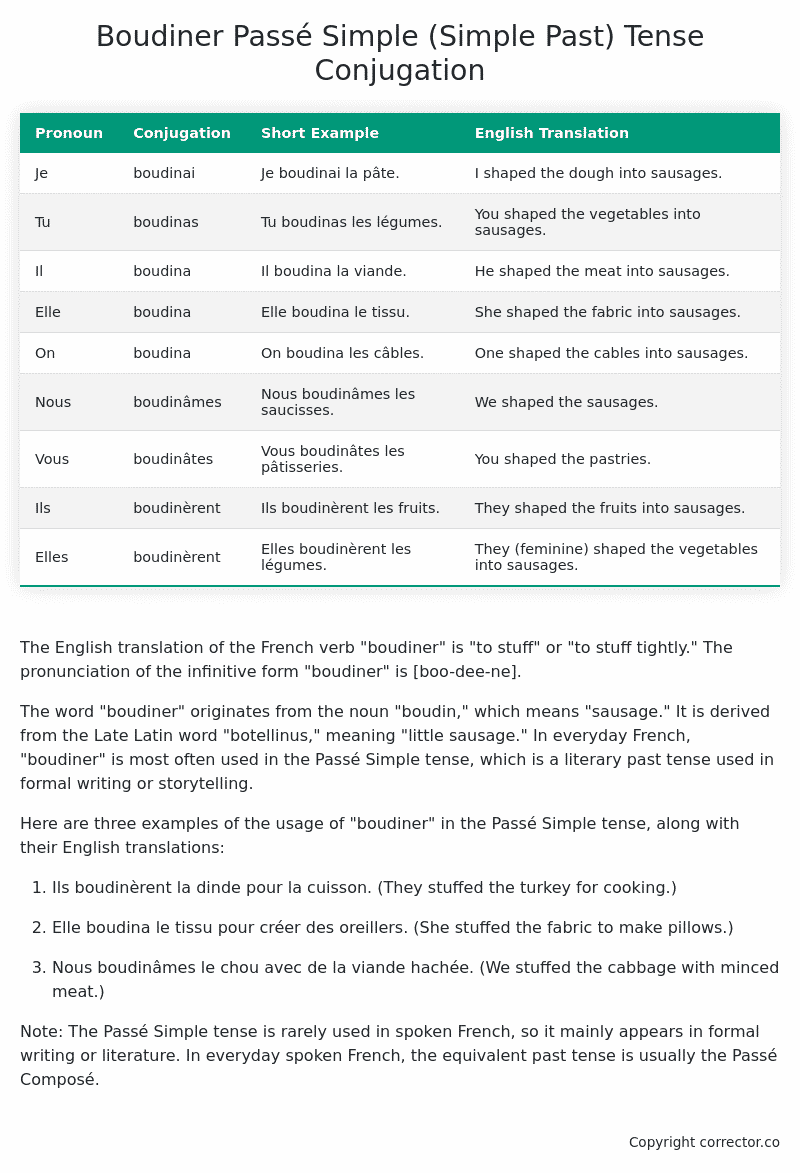Passé Simple (Simple Past) Tense Conjugation of the French Verb boudiner
Introduction to the verb boudiner
The English translation of the French verb “boudiner” is “to stuff” or “to stuff tightly.” The pronunciation of the infinitive form “boudiner” is [boo-dee-ne].
The word “boudiner” originates from the noun “boudin,” which means “sausage.” It is derived from the Late Latin word “botellinus,” meaning “little sausage.” In everyday French, “boudiner” is most often used in the Passé Simple tense, which is a literary past tense used in formal writing or storytelling.
Here are three examples of the usage of “boudiner” in the Passé Simple tense, along with their English translations:
-
Ils boudinèrent la dinde pour la cuisson.
(They stuffed the turkey for cooking.) -
Elle boudina le tissu pour créer des oreillers.
(She stuffed the fabric to make pillows.) -
Nous boudinâmes le chou avec de la viande hachée.
(We stuffed the cabbage with minced meat.)
Note: The Passé Simple tense is rarely used in spoken French, so it mainly appears in formal writing or literature. In everyday spoken French, the equivalent past tense is usually the Passé Composé.
Table of the Passé Simple (Simple Past) Tense Conjugation of boudiner
| Pronoun | Conjugation | Short Example | English Translation |
|---|---|---|---|
| Je | boudinai | Je boudinai la pâte. | I shaped the dough into sausages. |
| Tu | boudinas | Tu boudinas les légumes. | You shaped the vegetables into sausages. |
| Il | boudina | Il boudina la viande. | He shaped the meat into sausages. |
| Elle | boudina | Elle boudina le tissu. | She shaped the fabric into sausages. |
| On | boudina | On boudina les câbles. | One shaped the cables into sausages. |
| Nous | boudinâmes | Nous boudinâmes les saucisses. | We shaped the sausages. |
| Vous | boudinâtes | Vous boudinâtes les pâtisseries. | You shaped the pastries. |
| Ils | boudinèrent | Ils boudinèrent les fruits. | They shaped the fruits into sausages. |
| Elles | boudinèrent | Elles boudinèrent les légumes. | They (feminine) shaped the vegetables into sausages. |
Other Conjugations for Boudiner.
Le Present (Present Tense) Conjugation of the French Verb boudiner
Imparfait (Imperfect) Tense Conjugation of the French Verb boudiner
Passé Simple (Simple Past) Tense Conjugation of the French Verb boudiner (You’re reading it right now!)
Passé Composé (Present Perfect) Tense Conjugation of the French Verb boudiner
Futur Simple (Simple Future) Tense Conjugation of the French Verb boudiner
Futur Proche (Near Future) Tense Conjugation of the French Verb boudiner
Plus-que-parfait (Pluperfect) Tense Conjugation of the French Verb boudiner
Passé Antérieur (Past Anterior) Tense Conjugation of the French Verb boudiner
Futur Antérieur (Future Anterior) Tense Conjugation of the French Verb boudiner
Subjonctif Présent (Subjunctive Present) Tense Conjugation of the French Verb boudiner
Subjonctif Passé (Subjunctive Past) Tense Conjugation of the French Verb boudiner
Subjonctif Imparfait (Subjunctive Imperfect) Tense Conjugation of the French Verb boudiner
Subjonctif Plus-que-parfait (Subjunctive Pluperfect) Tense Conjugation of the French Verb boudiner
Conditionnel Présent (Conditional Present) Tense Conjugation of the French Verb boudiner
Conditionnel Passé (Conditional Past) Tense Conjugation of the French Verb boudiner
Conditionnel Passé II (Conditional Past II) Tense Conjugation of the French Verb boudiner
L’impératif Présent (Imperative Present) Tense Conjugation of the French Verb boudiner
L’impératif Passé (Imperative Past) Tense Conjugation of the French Verb boudiner
L’infinitif Présent (Infinitive Present) Tense Conjugation of the French Verb boudiner
L’infinitif Passé (Infinitive Past) Tense Conjugation of the French Verb boudiner
Le Participe Présent (Present Participle) Tense Conjugation of the French Verb boudiner
Le Participe Passé (Past Participle) Tense Conjugation of the French Verb boudiner
Struggling with French verbs or the language in general? Why not use our free French Grammar Checker – no registration required!
Get a FREE Download Study Sheet of this Conjugation 🔥
Simply right click the image below, click “save image” and get your free reference for the boudiner Passé Simple tense conjugation!

Boudiner – About the French Passé Simple (Simple Past) Tense
Formation
Usage
Narration
Historical Context
Interactions with other tenses
Passé Composé
Imparfait
Conditional and Subjunctive
Summary
I hope you enjoyed this article on the verb boudiner. Still in a learning mood? Check out another TOTALLY random French verb conjugation!


